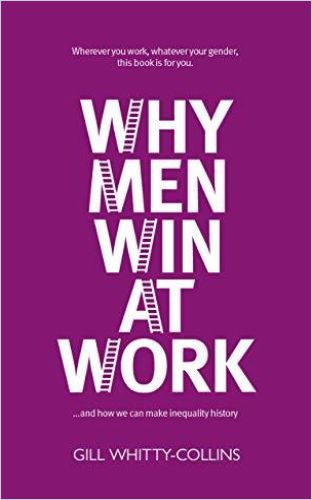“The Way to Success Is Knowing Your Strengths and Using Them.”

In a nutshell, why do men win at work?
There is in fact a simple answer to this question: Men win at work because the people who decide who to give the big jobs and promotions to give them to a man most of the time because they believe that the man is the stronger performer and the better choice. That’s why 90% of the senior leadership positions in the world are held by men. But it can’t possibly be right that a man is the right choice 90% of the time when 50% of the population are women – and we know that women are of equal intelligence, competence and leadership ability. So the real question is: Why do we believe that the man is better, even when he’s not? The answer to that is much more complex.

So why do decision-makers still think men are better suited for senior leadership positions?
This is due to a combination of many, many different invisible, unconscious and unintended forces that combine to make us believe that men are stronger and better performers. What makes it such a difficult issue to tackle is that we’re not just dealing with one driver, we’re dealing with a complex combination of issues and forces.
What are some of the more invisible aspects of workplace culture that hold women back?
The invisible power of culture is a hugely important force. When you find yourself in a culture where you feel you belong, you will be more relaxed and able to focus on your performance. By contrast, when you are in a culture where you don’t belong, you don’t feel comfortable and relaxed, and this negatively affects your performance. So in a male dominant culture, it’s easier for men to perform than women, which means sometimes the person we believe is the stronger performer is actually just more comfortable in the environment.
Some women bend over backwards trying to fit in…
It’s a completely human reaction to want to try to fit in. But the problem with fitting in is that you’re trying to be somebody you’re not. You’re trying to copy behaviors that are not yours naturally, and you’re doing that instead of focusing on your own strengths. The way to success is knowing your strengths and using them. You will never be successful by copying someone else’s behaviours and strengths – you will just be a diluted version of them, instead of the full, powerful version of you.
In a male dominant culture, it’s easier for men to perform than women.
Gill Whitty-Collins
Confidence is also so important. We are naturally drawn to confident people. If somebody is projecting confidence in themselves, we feel confident in them and confident to give them the big project or the big job. But the problem is that, for many reasons that start in childhood and at school, women generally have a lower sense of inner confidence than men. During meetings, for example, men will often dominate the share of voice and project much more confidently than women. So we always need to look behind that “confident curtain” and ask ourselves whether we are seeing the most competent person, or simply the most confident – they are not the same thing.
A core dilemma for woman leaders is the tension between being authentic and fitting in. What are the best ways for women to reconcile the two?
We really need to resist the natural, human urge to fit in. If we are trying to fit in, we are by definition copying others instead of being ourselves. This is not authentic – and people can smell inauthenticity, even if they can’t put their finger on it.
We always need to…ask ourselves whether we are seeing the most competent person, or simply the most confident – they are not the same thing.
Gill Whitty-Collins
I advise women to invest some time in understanding their unique strengths, owning and embracing them and making them a non-negotiable. So that means if they find themselves in a culture where their strengths are not seen or valued, they should walk away and take their talent and brilliance somewhere else.
We succeed by using our own strengths, so knowing our strengths is key. I’m a huge fan of Strengths Finder as the best way to find your strengths and superpowers and, once you know these, you will find your confident core. You will speak from there, with confidence, and people will be able to feel it.
How does the “myth of meritocracy” hurt women?
Women in general believe in the myth of meritocracy much more than men do. They believe that their work should speak for itself. Men are generally much savvier about the need to make their work and themselves visible.
We succeed by using our own strengths, so knowing our strengths is key.
Gill Whitty-Collins
I talk a lot about the Umbrella Theory – we all need to think about ourselves as working under open umbrellas with our bosses sitting above us. Our bosses will only see the tops of the umbrellas, not what is going on underneath. They will only see the great work we are doing under our umbrella if we move it aside and share what we are working on. Men are generally much better at self-marketing than women. They know that it isn’t enough just to do great work. The work needs to be visible and they need to be visible.
Do you think the shift to a virtual work environment has the potential of leveling the playing field a little bit?
I think this was the initial assumption for some. Many women were saying, “At least men won’t be able to do all that networking over coffee or drinks anymore as we’re all going to be on Zoom now.” We quickly realized, however, that Zoom wasn’t a great equalizer. Men generally “give good meeting,” and that’s also true on Zoom. It’s arguably even harder for women to get a word in on a video call when they are just a box on a screen, and projecting with confidence is just as or even more important in video meetings. So in many ways, the shift to virtual meetings has put female attendees at a further disadvantage. And let’s also not fool ourselves that the networking and self-marketing stopped with the pandemic – the savvy ones just moved it to video!
Men are generally much savvier about the need to make their work and themselves visible.
Gill Whitty-Collins
With many companies now adopting a hybrid work model, how does this new work arrangement put women at a disadvantage? What are the opportunities?
In theory, hybrid work arrangements should be fantastic for women because it gives them flexibility. But unless employers get smarter, hybrid work will magnify existing inequalities. Unfortunately, we still live in a world where women carry 80% of the unpaid work for the home and family, and men will be spending more time in the office than women. Presenteeism is very real. There is an unconscious bias toward people who are visible and present in front of you versus people who work from home and you don’t see, even if they are more productive.
The shift to virtual meetings has put female attendees at a further disadvantage.
Gill Whitty-Collins
On the flip side, there is also a bias against men who ask for flexible work arrangements. Many men have told me that their managers raise eyebrows and question their commitment to their career if they ask for the same kind of flexibility as women.
So employers need to change and hybrid work policies need to be truly gender neutral, in practice and not just on paper. We won’t get to 50-50 at work until we get to 50-50 at home, and we won’t get to 50-50 at home as long as we all keep reinforcing the stereotype that it’s the woman who’s mainly responsible for taking care of the household and dependents – and thus needs the flexible work support.
Hybrid work policies need to be truly gender neutral, in practice and not just on paper.
Gill Whitty-Collins
So it’s about making men comfortable to ask for working partially from home…
Absolutely. Hybrid work is a great thing, as long as it is gender neutral. We know that mums benefit from it, but the reality is that everyone can. It can transform a man’s well-being, allowing him to spend more time with his family and to contribute as an equal partner at home. This in turn enables equality for his partner at work. And equality and diversity is good for business. Employers should be embracing and celebrating men who want hybrid work – it’s a huge opportunity for everyone.
About the Author
Popular keynote speaker and consultant Gill Whitty-Collins worked 26 years for P&G, most recently as a senior vice president in charge of several global brands.






